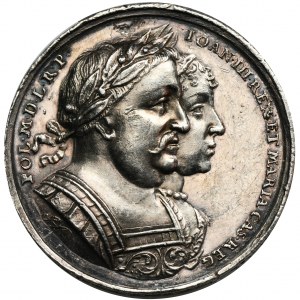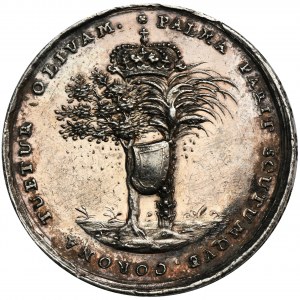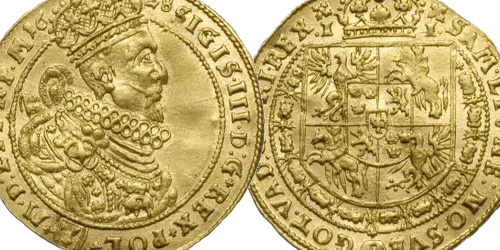Extremely rare medal weighing six ducats, minted on the occasion of the royal couple's visit to Gdansk in 1677.
The medal is by Jan Höhn the younger.
The six-ducat medal minted in silver has not been previously listed at auction in Poland.
This type item, from the collection of Count Emeric Hutten-Czapski, was recently sold at the 374th Spink Auction of January 16, 2022 for $8,000.
Minor surface blemishes, typical of these issues, but a beautifully preserved piece with a deep medal mirror, covered with an aged patina.
An incredible combination of rarity and beauty, highlyrecommended!
Obverse: busts of John III Sobieski and Queen Mary Kazimiera facing right, both wearing laurel wreaths on their heads
JOAN III REX ET MARIA CAS REG POL M D L R P (John III the King and Maria Kazimiera Queen of Poland, Grand Dukes of Lithuania, Russia, Prussia).
Reverse: crowned two trees, a palm tree and an olive tree, between them a shield of the coat of arms of the Sobieski family, on the rim an inscription SIT PAX IN TURRIBUS TUIS ANNO 1677 D 1 AUGUST (May there be peace in thy towers, the year 1677 on August 1)
PALMA PARIT SCUTUMQUE CORONA TUETUR OLIVAM (The palm tree gives birth to a knocker, the crown defends the oil)
Silver, diameter 34 mm, weight 20.42 g
Edward Raczynski writes on this item: "John III's trip to Royal Prussia in 1677 was the reason for minting this medal. The King visited this province at the strenuous insistence of the city of Danzig, where disagreements between the magistrate and the guilds threatened a dangerous outbreak. On May 23 the King arrived in Toruń, where he was received with great grandeur. At his departure the magistrate presented him with a monetary gift, which today would be considered unworthy of royal dignity. For the King received 500 Red Zlotys, the Queen 280, Prince James 100, while Princess Teressa Kunegunda, barely one year old, received fruit and flowers.
From Toruń the King sailed to Gniewo, and from there to Malborg, visited Zulawy and on August 1 arrived in Gdansk. After all, his hopes of calming the unrest between the magistrate and the guilds did not come true. The agreement presented by the King did not satisfy either side, and the final settlement of the dispute was postponed until further notice.
During her stay in Gdansk, Queen Marya Kazimira gave birth to a son Alexander on September 10.
The inscription of the reverse side of this medal is convoluted and not well chosen. We guess, however, that it was intended to express that an olive tree, that is, peace from palm trees or victories has support, and that this peace under the protection of the King in its security will remain unshaken. Therefore, this medal applies both to the success of the war and to the peace of the preceding year on October 17 with the Turks concluded at Zhuravna; perhaps it is also a remembrance of the dissolution of the Queen, who of the preceding year on March 4 gave birth to her daughter Thérèse Kunegunda, then Elector of Bavaria, or rather the dissolution of the same Queen in Danzig of that year 1677, where her son Alexander was born. Note by X. Albertrande."









